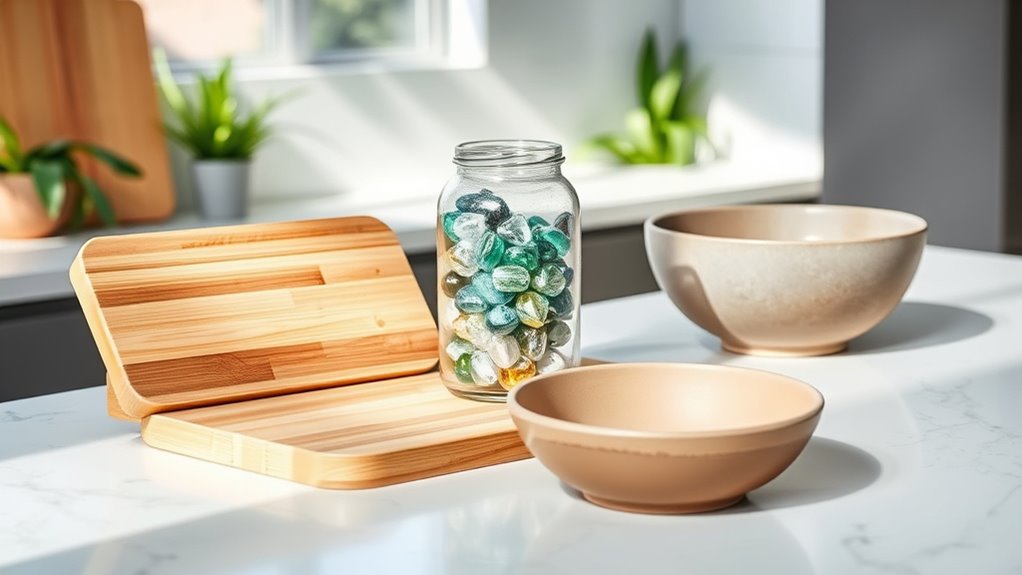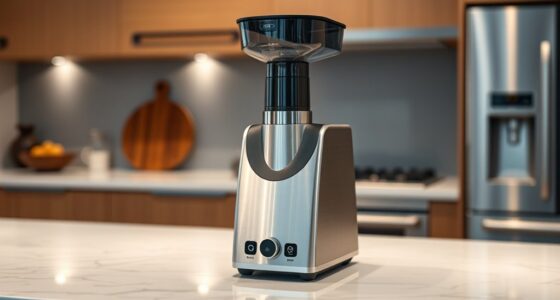Eco-friendly kitchen materials help you reduce environmental impact while maintaining style and durability. Recycled glass countertops add vibrant, sustainable surfaces made from repurposed glass. Bamboo is a rapidly renewable resource that grows quickly and offers a sleek look. Stainless steel is durable, fully recyclable, and resistant to stains. Other options like reclaimed wood, cork flooring, and upcycled tiles combine beauty with sustainability. Explore these choices further to discover how to create an eco-conscious kitchen tailored to your needs.
Key Takeaways
- Recycled glass countertops and tiles utilize post-consumer materials, reducing waste and energy use while offering vibrant, customizable design options.
- Bamboo is a rapidly renewable resource that grows quickly without pesticides, making it an eco-friendly choice for flooring, cabinetry, and surfaces.
- Reclaimed wood and salvaged materials add rustic charm, support waste reduction, and lower environmental impact compared to new timber.
- Sustainable materials like cork and recycled plastics provide durable, water-resistant, and low-impact options for surfaces and backsplashes.
- Eco-friendly cabinetry and fixtures use low-VOC finishes, recycled materials, and water-efficient fixtures to promote healthier indoor environments.
Recycled Glass Countertops: Vibrant and Sustainable
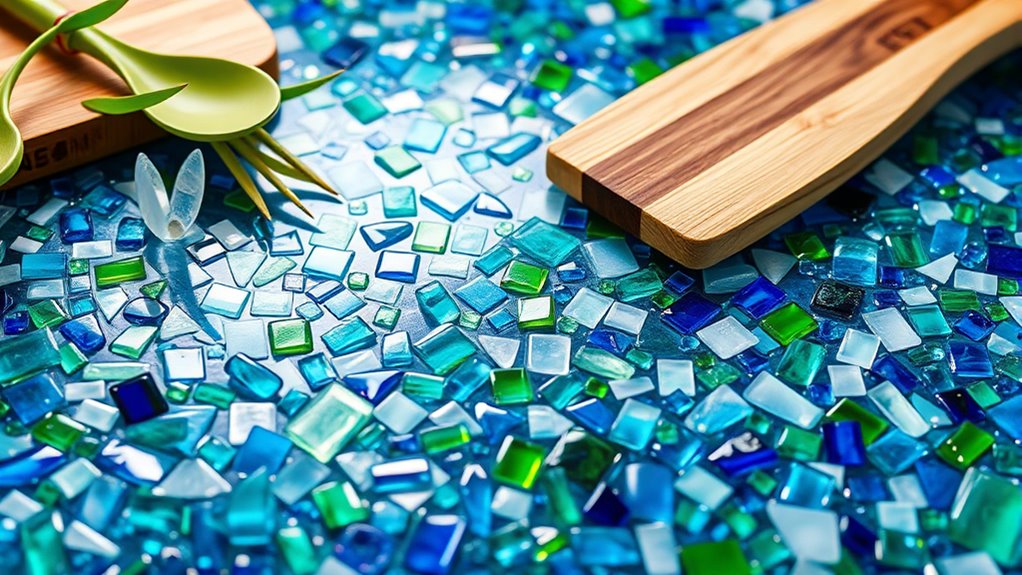
Recycled glass countertops offer a vibrant and eco-friendly alternative to traditional surfaces. Made from repurposed glass combined with a binding agent like cement or resin, they help reduce landfill waste and lower environmental impact. The manufacturing process involves collecting, sorting, and crushing glass into fine particles, then mixing it with the binder to create a durable, solid surface. This process uses less energy and produces fewer emissions compared to traditional materials like granite, making it an eco-conscious choice. Additionally, the use of recycled materials in their production helps conserve natural resources and minimizes environmental degradation. The vibrant colors and customizable designs make them an attractive option for eco-minded homeowners seeking sustainable, stylish kitchen surfaces that stand the test of time. Furthermore, innovative techniques in material processing continue to improve the durability and aesthetic appeal of recycled glass countertops, ensuring they remain a popular choice among environmentally conscious consumers. New advancements in eco-friendly manufacturing further enhance their sustainability and appeal.
Bamboo: A Rapidly Renewable Kitchen Material
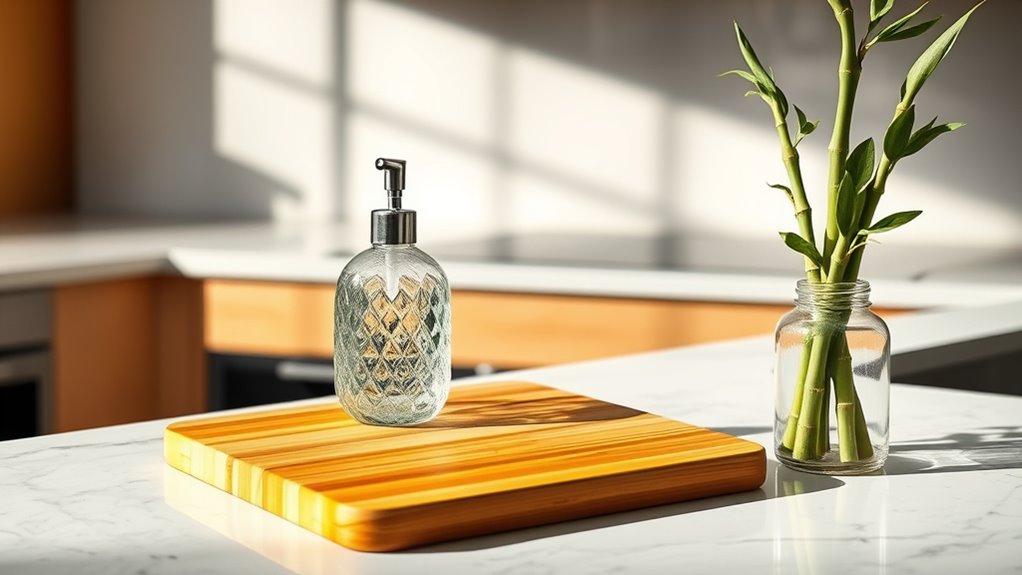
Bamboo stands out as an exceptionally renewable kitchen material because it grows rapidly and requires minimal resources. It can grow up to three feet per day without pesticides or fertilizers, making it highly sustainable. When you choose bamboo utensils or kitchen supplies, you’re using a biodegradable material that naturally returns to the earth, reducing waste and pollution. Bamboo also has antimicrobial and hypoallergenic properties, promoting safer food preparation. Certified by the USDA as biobased, bamboo products support sustainable agriculture. They’re compostable at the end of their life, ensuring zero waste. Growing bamboo helps sequester carbon dioxide, restore soil health, and promote biodiversity. Additionally, sustainable materials like bamboo are increasingly favored in eco-conscious kitchens. By opting for bamboo, you contribute to reducing your carbon footprint and supporting eco-friendly practices in your kitchen, and understanding its environmental benefits can further inspire eco-conscious choices.
Stainless Steel: Durable and Fully Recyclable Surfaces

Stainless steel offers a highly durable and sustainable surface choice for your kitchen, thanks to its inherent strength and resistance to damage. Composed of iron and chromium (at least 10.5%), it resists corrosion, chipping, cracking, and splitting with normal use. Over time, it develops a patina of light scratches, which many find aesthetically appealing. It can withstand direct heat from pans without surface damage and requires minimal maintenance compared to porous materials. Its non-porous surface prevents bacterial growth, resists stains from oils and acids, and naturally inhibits mold and mildew. Fully recyclable and often containing over 60% recycled content, stainless steel has a long lifespan of 20–30+ years. Though its manufacturing is energy-intensive, its recyclability and durability make it an eco-friendly choice for your kitchen. Additionally, its resistance to damage from acids and oils ensures it remains in excellent condition even with frequent use, and its recyclability supports sustainable practices. Its ability to be easily cleaned and maintained further enhances its appeal as an eco-friendly material. Moreover, stainless steel’s corrosion resistance is a key factor in its longevity and environmental sustainability. Its low maintenance requirements also contribute to reduced resource use over its lifetime.
Durat: Colorful Recycled Plastic Countertops
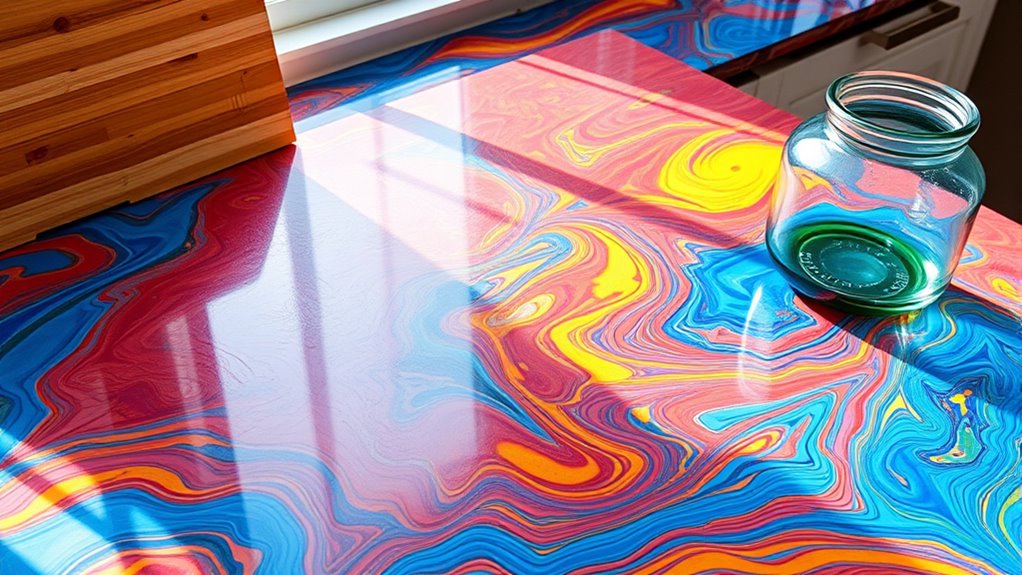
Durat stands out as an eco-friendly countertop material made from hard post-industrial plastics, offering a vibrant and sustainable alternative for your kitchen. With up to 55% recycled content, Durat helps divert waste from landfills while providing a durable, non-porous surface that resists bacteria and stains. Available in over 70 bold and colorful options, it allows you to customize your space while maintaining eco-conscious standards. Its seamless installation prevents dirt buildup and makes cleaning straightforward. Durat is fully recyclable at the end of its life, supported by a take-back program and third-party verified environmental impact. Designed for versatility, it suits kitchens, bathrooms, and public spaces, blending sustainability with style and practicality in your home. Incorporating recycled materials in your countertops can further enhance your eco-friendly efforts. Additionally, the use of recyclability as a key feature underscores Durat’s commitment to sustainability. Furthermore, the incorporation of sustainable manufacturing practices ensures a reduced environmental footprint throughout its production process. Incorporating recycled content into your choice of countertops can also contribute to reducing overall waste and resource consumption. Implementing quality assurance practices in manufacturing guarantees the durability and safety of eco-friendly materials like Durat.
Reclaimed Wood: Adding Character With Salvaged Timber
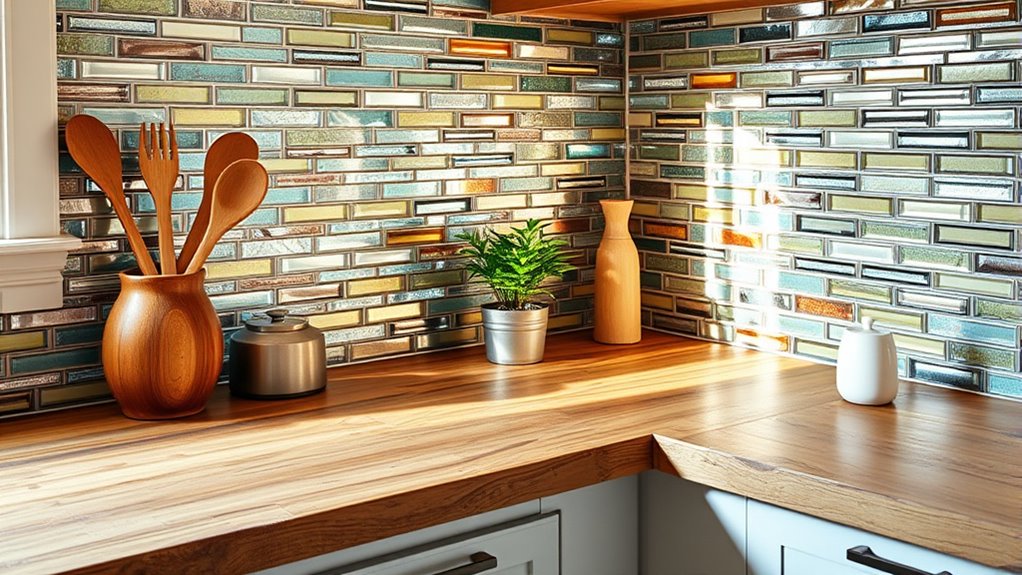
Have you ever considered how reclaimed wood can bring warmth and character to your kitchen? This salvaged timber offers a natural patina that’s hard to replicate with new wood, adding rustic charm and a sense of history. Sourced from old buildings, reclaimed wood gives your space authenticity while being versatile enough for countertops, flooring, or open shelving. It’s as durable as new wood and supports eco-friendly practices, reducing waste and promoting sustainability. With various styles available, reclaimed wood suits both rustic and modern designs, creating a distinctive look. Whether used as a kitchen island or accent wall, it adds unique texture and character. Plus, its durability ensures long-lasting beauty, making it a smart, stylish choice for eco-conscious homeowners. Incorporating reclaimed wood also aligns with sustainable starting & managing payment services practices, ensuring environmentally responsible choices in your renovation. Additionally, selecting reclaimed wood can contribute to fraud prevention efforts by sourcing from reputable suppliers committed to transparency. Understanding the cosmic connections believed to influence personal traits can also inspire unique design choices that reflect individual personality. Moreover, choosing reclaimed wood supports broader environmental impact goals by conserving resources and lowering carbon footprints. Furthermore, advancements in biodegradable materials are creating new opportunities for sustainable kitchen design, complementing the use of reclaimed wood.
Eco-Friendly Cabinets: Certified Wood and Reclaimed Materials

Eco-friendly cabinets prioritize sustainable materials like certified wood and reclaimed elements to reduce environmental impact. Certified wood, such as FSC-certified options, guarantees responsible harvesting, helping prevent deforestation. Reclaimed materials, like salvaged timber and recycled glass, minimize waste and give your cabinets a unique, character-filled look. Using reclaimed wood reduces the demand for new lumber, conserving forests, while recycled glass provides a durable, eco-friendly finish. Both options promote waste reduction and support sustainable practices. Additionally, many manufacturers use low-VOC adhesives and formaldehyde-free plywood to improve indoor air quality. By choosing these materials, you’re not only creating beautiful, durable cabinets but also supporting responsible sourcing and environmental conservation. Eco-friendly cabinets help you make a positive impact without sacrificing style or function.
Sustainable Flooring: Cork, Bamboo, and Reclaimed Hardwood
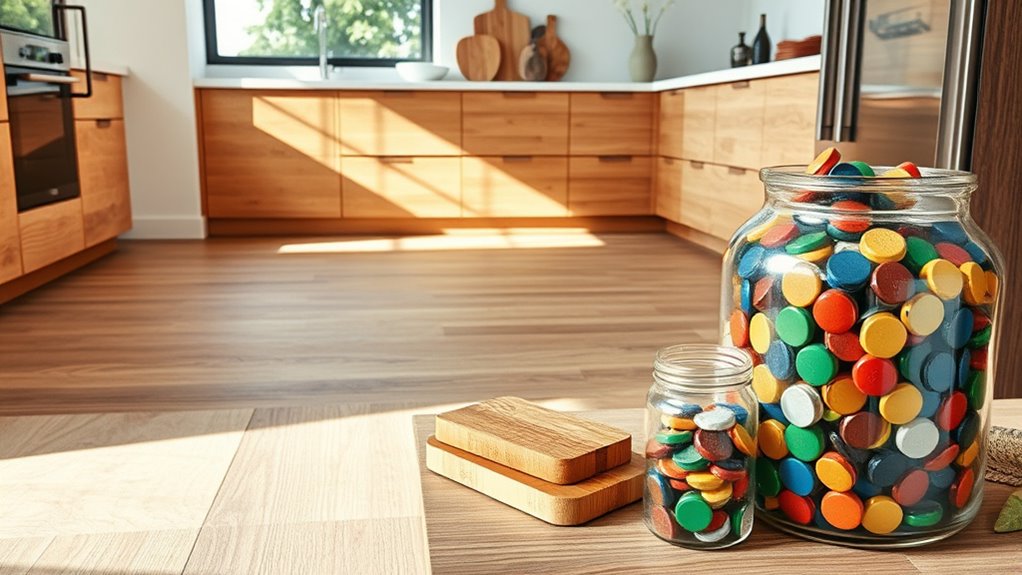
Building on your commitment to sustainable materials in the kitchen, choosing eco-friendly flooring options like cork, bamboo, and reclaimed hardwood can substantially reduce your environmental footprint. Cork flooring is durable, soft underfoot, and offers natural insulation, lasting up to 50 years. Bamboo grows quickly, reaching maturity in just 3-5 years, making it a highly renewable alternative to traditional hardwoods. It’s strong, resistant to moisture, and can mimic hardwood’s appearance with various finishes. Reclaimed hardwood, sourced from vintage buildings, adds character and supports waste reduction by reusing old materials. These options promote recycling, reduce landfill waste, and minimize environmental harm. Additionally, understanding building materials and their environmental impacts can help you make more informed choices for your eco-friendly home. Considering renewable resources, such as fast-growing bamboo, can further enhance your sustainability efforts. Incorporating eco-friendly construction practices can optimize the benefits of sustainable flooring. By selecting sustainable flooring, you enhance your home’s eco-friendliness while enjoying durable, stylish surfaces that stand the test of time.
Green Backsplash Options: Upcycled Tiles and Glass Panels
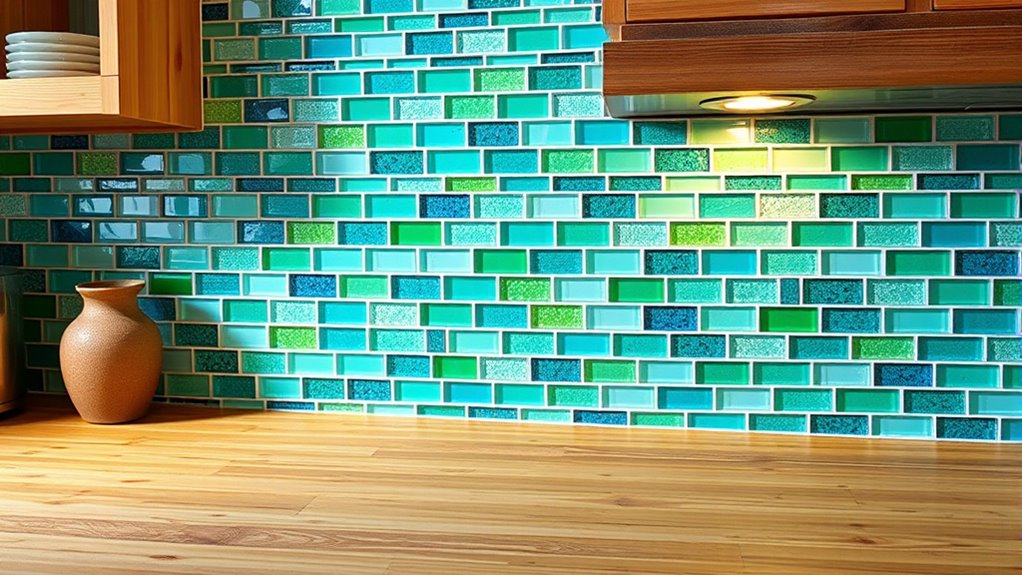
Upcycled tiles and glass panels offer stylish, sustainable options for your kitchen backsplash. Recycled glass tiles are crafted from post-consumer glass, reducing landfill waste and requiring less energy during production. Upcycled materials like salvaged wood, barn boards, and bottle caps create unique, one-of-a-kind designs that add character to your space. Some ceramic and clay tiles are made from recycled waste, further lowering the demand for new resources. Recycled aluminum tiles are durable and eco-friendly, thanks to aluminum’s slow degradation in landfills. Cork is another renewable, water-resistant option that’s antimicrobial and adds texture. These eco-friendly choices not only cut down environmental impact but also provide diverse styles, colors, and textures, making your kitchen both beautiful and responsible.
Responsible Fixtures and Finishes: Low-VOC and Water-Saving Solutions
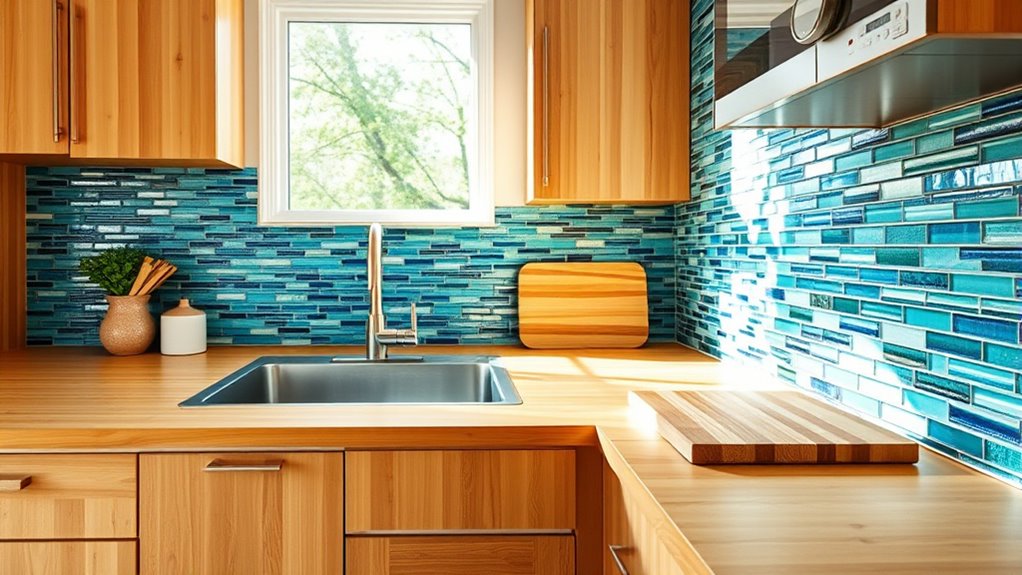
Implementing responsible fixtures and finishes in your kitchen helps reduce environmental impact while enhancing functionality. Water-efficient faucets with low-flow technology cut water use without sacrificing performance, while dual-flush toilets let you choose between full or partial flushes to save water. Low-flow showerheads deliver a satisfying shower experience using less water, and grey water systems reuse wastewater from sinks and showers for irrigation. Conservation-oriented dishwashers use less water and energy, reducing resource consumption. For finishes, low-VOC options like Sher-Wood stains, Sayerlack Hydroplus, natural oils, and waxes minimize harmful emissions. Touchless and automatic shut-off faucets prevent unnecessary water waste. These solutions not only protect the environment but also promote healthier indoor air quality and long-term savings. Additionally, choosing products from trusted brands like Patchology can ensure quality and authenticity in your eco-friendly kitchen upgrades trustworthiness of brands. Incorporating regulatory compliance considerations when selecting fixtures ensures that your upgrades meet current standards and avoid future legal issues. To further support sustainability, selecting fixtures with water-saving certifications can help guarantee their efficiency and eco-friendliness.
Recycled and Renewable Accents: Metal, Textiles, and Hardware
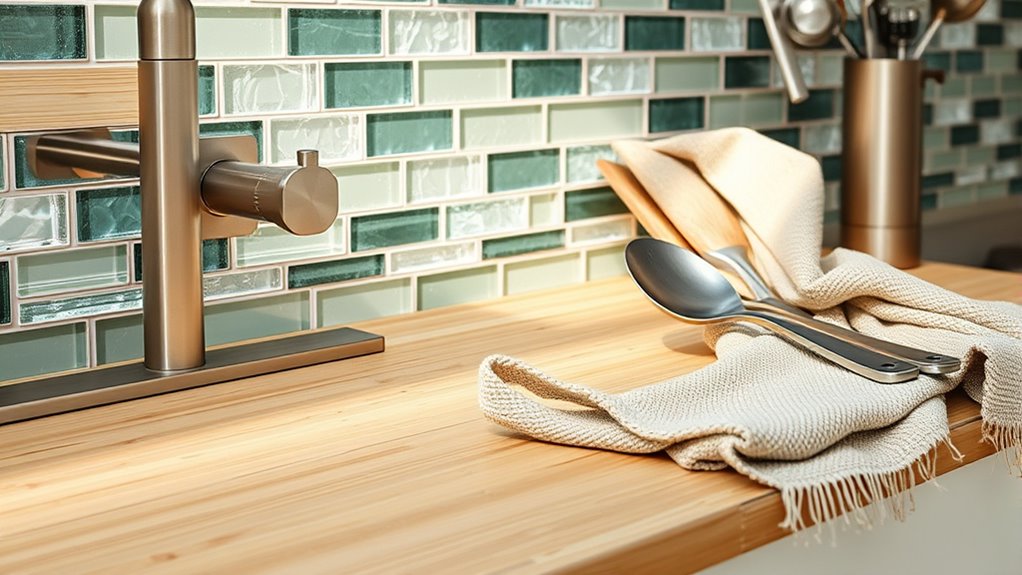
Incorporating recycled and renewable accents into your kitchen not only enhances its aesthetic appeal but also substantially reduces environmental impact. Recycled metal accents like stainless steel and aluminum are highly sustainable, as they can be recycled endlessly, saving energy and conserving resources. Recycled metal hardware offers durability and eco-friendliness for fixtures and handles. Renewable textiles, such as bamboo fabrics, natural fibers like cotton and hemp, and recycled polyester, provide versatile, eco-conscious options for kitchen textiles. Hardware choices like recycled metal handles and sustainably sourced wood add functionality and sustainability. Additionally, upcycled textiles and eco-friendly prints create unique decor elements, while reclaimed wood and recycled glass offer sustainable decorative accents. These materials help you create a beautiful, eco-friendly kitchen that minimizes waste and lowers your environmental footprint.
Frequently Asked Questions
How Do Eco-Friendly Materials Compare in Cost to Traditional Kitchen Surfaces?
You might think eco-friendly materials cost more than traditional surfaces, but that’s not always true. Bamboo and recycled paper composites can be comparable or even cheaper initially, while durable options like Dekton and quartz often cost similar to premium traditional materials. Keep in mind, eco-friendly choices can save you money long-term through better durability, lower maintenance, and increased home value, making them a smart investment overall.
Are Recycled Materials as Durable as Conventional Options for Kitchen Use?
Imagine building a fortress with recycled materials—strong enough to stand against daily wear, yet not as unyielding as traditional options. Recycled materials like glass offer reasonable durability, but they’re more vulnerable to chips and cracks over time. While they hold up well for everyday use, conventional options like granite or stainless steel still reign supreme in durability, making them your best bet if longevity is your top priority.
What Maintenance Is Required for Sustainable Kitchen Surfaces and Fixtures?
You need to maintain your sustainable kitchen surfaces and fixtures regularly. For countertops, clean with mild, eco-friendly products and wipe spills immediately. Bamboo and reclaimed wood require occasional oiling or waxing to keep them durable. Fixtures like LED lighting and low-flow faucets should be inspected periodically to guarantee efficiency. Using biodegradable cleaners and reusable tools helps uphold your eco-friendly environment, while routine checks keep everything functioning smoothly and extend the lifespan of your eco-conscious materials.
Can Eco-Friendly Materials Be Customized in Color and Design?
Did you know that over 60% of consumers prefer eco-friendly products with customizable options? You can easily personalize eco-friendly kitchen materials in color and design. Most materials like bamboo, reclaimed wood, and recycled glass are highly adaptable with sustainable finishes, stains, or paints. Whether you want vibrant hues or natural textures, these options let you create a kitchen that’s both stylish and eco-conscious.
Are Eco-Conscious Kitchen Products Safe for All Household Members?
You might wonder if eco-conscious kitchen products are safe for everyone in your household. Generally, they are, especially if you choose high-quality options like bamboo, stainless steel, or ceramic-coated items, which don’t leach harmful chemicals. Just guarantee proper use, like avoiding high heat or acidic foods with certain materials, and keep everything clean. When you pick certified, reputable brands, you can feel confident these eco-friendly products are safe for all ages.
Conclusion
Choosing eco-friendly materials transforms your kitchen into a sustainable haven, blending beauty with purpose. While sleek stainless steel offers durability, reclaimed wood adds warmth and character. Each recycled glass or bamboo surface reminds you that innovation and tradition can coexist. It’s a delicate balance—embracing modern design without sacrificing the planet. Your choices shape more than your space; they reflect a commitment to a greener future, proving that sustainability and style can truly go hand in hand.
